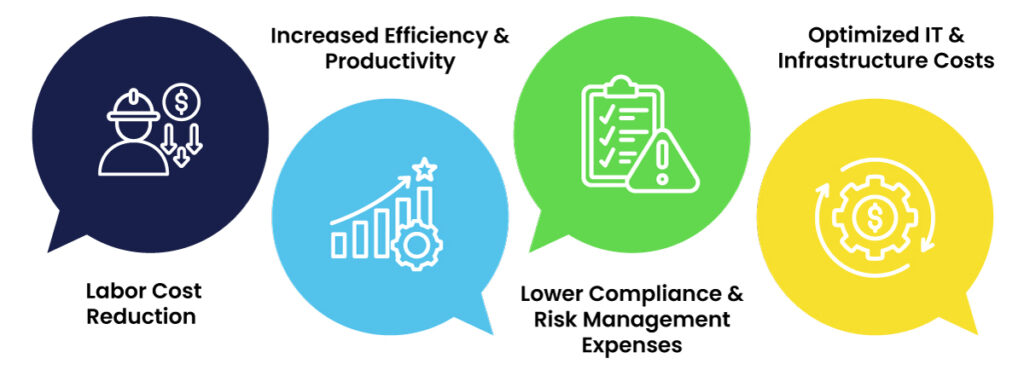Operational costs can be a significant burden for businesses, impacting profitability and efficiency. AI-driven process automation offers a strategic solution to reduce expenses while increasing productivity and accuracy. According to a report by McKinsey, automation could save businesses up to 20-30% in costs by streamlining workflows and reducing manual intervention. Charter Global helps businesses implement AI-driven automation solutions that optimize operations, enhance decision-making, and drive sustainable growth.
The Cost Challenges Businesses Face
Organizations across industries face escalating operational expenses due to factors such as:
- Labor costs: Employee salaries, benefits, and training can be expensive, especially for repetitive and administrative tasks.
- Inefficient processes: Manual workflows lead to bottlenecks, errors, and slow turnaround times.
- Compliance and regulatory costs: Meeting industry standards often requires significant investment in monitoring and documentation.
- IT infrastructure and maintenance: Managing on-premises systems and outdated software can be resource-intensive.
AI-driven automation addresses these challenges by optimizing workflows and reducing the need for human intervention in repetitive tasks.
How AI-Driven Automation Reduces Costs
AI-powered process automation integrates machine learning, natural language processing (NLP), and robotic process automation (RPA) to streamline operations.

Here’s how businesses benefit:
1. Labor Cost Reduction
- AI-powered chatbots handle customer service inquiries, reducing the need for large support teams.
- Automated data entry and document processing eliminate human errors and free employees for higher-value tasks.
- AI-driven hiring platforms optimize candidate screening, reducing HR workload and recruitment costs.
2. Increased Efficiency and Productivity
- AI algorithms analyze and predict workflow inefficiencies, enabling proactive adjustments.
- Automated supply chain management ensures optimal inventory levels, minimizing overstock and shortages.
- AI-powered predictive maintenance reduces downtime and costly equipment failures.
3. Lower Compliance and Risk Management Expenses
- AI-driven compliance monitoring ensures adherence to regulatory frameworks, reducing penalties.
- Automated fraud detection systems identify anomalies in transactions, preventing financial losses.
- Smart contract automation in legal and financial processes minimizes manual oversight.
4. Optimized IT and Infrastructure Costs
- Cloud-based AI solutions reduce the need for expensive on-premise hardware and maintenance.
- Automated cybersecurity protocols enhance threat detection and response without additional manpower.
- AI-powered IT service management automates ticket resolution, minimizing help desk expenses.
AI Automation Success: Real-World Impact
Businesses that have adopted AI-driven automation report measurable cost savings and efficiency improvements:
- A Deloitte study found that 53% of companies that implemented RPA reduced operational costs by over 10%.
- 80% of business leaders believe AI will help reduce hiring and training costs by automating routine tasks (PwC).
- A case study from IBM revealed that AI-powered customer service chatbots reduced response time by 50%, leading to $8 million in annual savings.
Implementing AI-Driven Automation: Key Considerations
While AI automation presents significant cost-saving opportunities, businesses must approach implementation strategically. Key considerations include:
- Assessing Automation Potential: Identify high-volume, rule-based processes that can benefit from AI-driven automation.
- Choosing the Right AI Tools: Determine whether RPA, NLP, or machine learning best suits your operational needs.
- Integration with Existing Systems: Ensure seamless compatibility with current software and infrastructure.
- Employee Training and Change Management: Upskilling teams to work alongside AI tools fosters smooth adoption.
- Continuous Monitoring and Optimization: AI models require ongoing fine-tuning for sustained efficiency and accuracy.
Partner with Charter Global for AI-Powered Cost Reduction
Charter Global specializes in AI-driven process automation solutions tailored to your business needs. By integrating advanced AI technologies, we help organizations cut costs, improve efficiency, and stay competitive in an evolving market.
Book a consultation today—email us at [email protected] or call 770-326-9933 to learn how AI automation can transform your operations.
